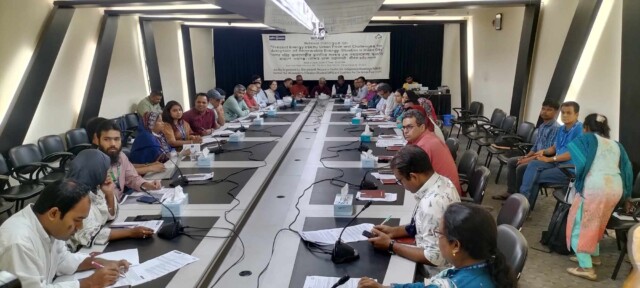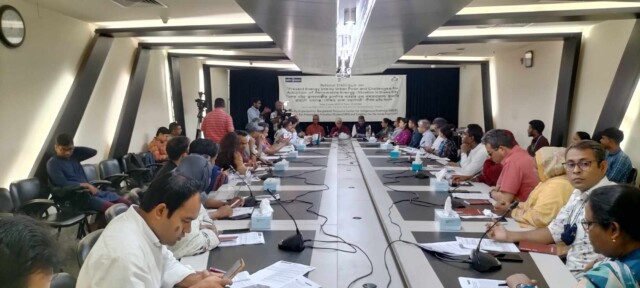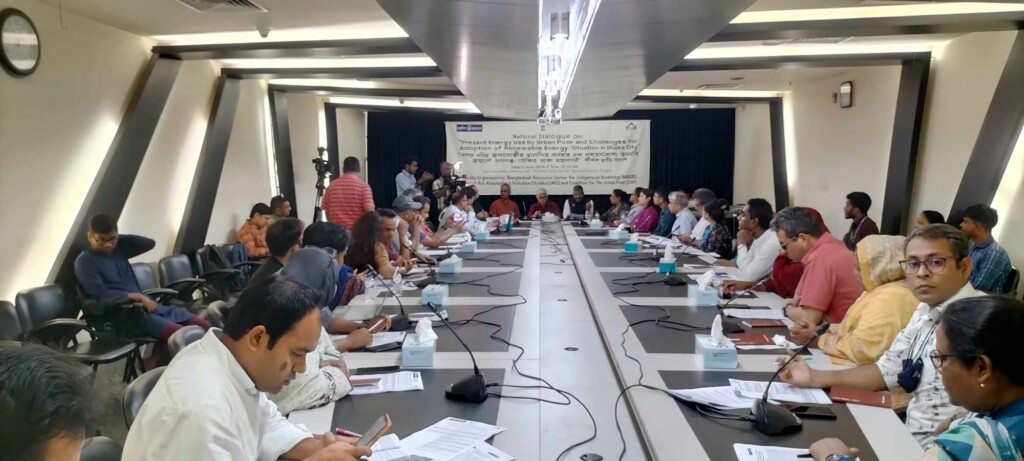A national dialogue titled ‘Present energy use by urban poor and challenges for adoption of Renewable Energy: Situation in Dhaka City” was jointly organized by BARCIK (Bangladesh Resource Center for Indigenous Knowledge), CAPS (Center for Atmospheric Pollution Studies) and CUP (Coalition for the Urban Poor) where president of Asiatic Society and Chairman of Center for Urban Studies, Professor Nazrul Islam attended as chief guest. The event was held at Daily Star Center in Dhaka today escorting other special guests that include: Program manager of European Union Chiara Viddussi, State University Pro Vice Chancellor Nawzia Yasmin, CAPS Adviser Professor Mohammad Ali Naqi were present as special guests of the event.
Professor Adil Mohammad Khan of Jahangir Nagar University, Deputy Director Mohammad Hasnat Morshed Bhuiya, Joint General Secretary Aminur Rasul of BAPA, Executive President of South Asian Climate Change Journalists Forum Karamat Ullah Biblab, Scientific Officer of CAPS Nasir Ahmed Patwari , Executive director of Eco Network Global Shamim Ahmed Mridha, President of Bastivasi Odhikar Sukhara Committee Hosne Ara Rafeza, Advocate Rashed Zaman, Water, Food and Climate Domain Coordinator of Helvetas Mohammad Mahmudul Hasan and others spoke in the event and shared their views and concerns.

Professor Nazrul Islam of Dhaka University said in his speech, “Bangabandhu was the first person to speak about the protection of slum dwellers rights. But Rajuk has no plans for the urban poor.’ He said, the study results presented here should reach the important departments of the government. There was Urban policy formulated before but this policy was not properly implemented. The Urban policy accommodates the rights of the urban poor including their right to energy.
Professor Adil Muhammad Khan said, slum dwellers should be brought to formal housing. Because their energy problems cannot be solved in informal housing. They should be included in the plan. They also should be given easy access to solar and gas connection. Maksud Hashem, the chief city planner of Dhaka North City Corporation, said, “The contribution of slum dwellers to the country’s economy should be researched seriously. Because they cannot survive if they have no role in the economy. Their rights will not be established. Mohammad Hasnat Morshed Bhuiya said, the energy needs of the slum dwellers should be looked at. The problem should be solved in that light. State University Pro-Vice Chancellor Nawzia Yasmin said, apart from solar, we can think about wind, hydro, biogas. We should also think how we can preserve these renewable energy. Besides, political commitment is also needed in this regard to transform the energy system into renewable one.
Chairman of the Center for Atmospheric Pollution Study and Professor of Stamford University Ahmad Kamruzzaman Majumdar presided over the national dialogues where BARCIK’s executive director Sukanta Sen delivered welcome speech and BARCIK’s project director Md. Kamruzzaman Sagar presented the study results conducted in Dhaka slum areas.
The study finding stated that the average monthly electricity expenditure of urban poor families in Dhaka city is BDT 875. The highest electricity bill is Tk 1569 per month in Karail Basti. The lowest is only BDT 324 at Gabtali City Colony. 52.45% households pay the bill to the house owner, 36.03% to the local leaders. On the other hand, about 42% of urban poor households use line gas. 52.55% of them are valid connections, 47.45% are invalid connections. Households pay an average gas bill of BDT 589 per month. Minimum 100 taka and maximum 1600 taka. Besides, 75% of households use wood for cooking. The use of plastic and polyethylene in cooking is also increasing. 40% households are using plastic polythene for cooking. The study also said that 8% of households had accidents in the past two years, 54% of which were from cooking sticks. 22% of household members had a severe cough in the past six months due to cooking fumes. The study revealed that only 10% of the respondents were familiar with the term “renewable energy”.

Recommendations
- “Renewable Energy for All” should be considered for the effective implementation of recently declared City Climate Action Plans by both Dhaka South and North City Corporations to achieve 85% of grid electricity from renewable energy by 2050. Promote green energy for health and environmental security of urban poor is very much important in this regard. Dream for an environment friendly and livable city for all would not be possible without the inclusion of urban poor. There should be recognition of urban poor peoples’ rights as a city dweller as well as citizen to enjoy basic services like electricity. There is a need to develop sustained program to provide the necessary technical and financial support to urban poor communities to transition to renewable energy sources such as solar and waste-to-energy. Encouraging the use of renewable energy, taking initiatives, and making policies inclusive in this regard will improve the quality of life of the urban poor, reduce energy costs and improve the environment.
- Electricity distribution in urban poor areas can be facilitated through encouraging rooftop solar power generation with net metering in public, private and commercial buildings in the city or community-based micro grids. The building owners can be adequately incentivized.
- There exists high level of polluting cooking practice among urban poor causing environmental and health hazards. Government policies should address this through provision of subsidy on clean cooking for the urban poor.
- There is a lack of adequate information and awareness among people about renewable energy. Therefore, awareness needs to be increased. Both governmental and non-governmental organizations should take various initiatives for promotion and dissemination of knowledge. Latest technological improvement, price and other necessary information related to solar and other renewable energy can be made available.
- In urban poor areas, there should be proper assessment of local need. Various packages tailored to the capacity and demands of urban poor communities can be promoted and sold at subsidized prices, both by the government and non-governmental entities. To accelerate the transition, efforts should focus on making solar panels more affordable and simplifying the process of installing solar energy meters.
- Local government like City Corporations, municipalities have a major role in the promotion of renewable energy. Local governments and other organizations should take initiatives to increase the use of renewable energy/fuel to implement the Mujib Climate Prosperity Plan pledges, address climate change risks and control pollution.

